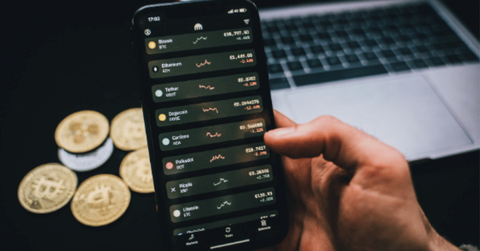Crypto Wallets Are the New Status Symbol — Here's Why

April 7 2025, Published 3:00 a.m. ET
Digital flex matters just as much as physical ones these days. Crypto wallets have completely transformed - they're not just storage solutions anymore but full-on status symbols. The younger generation isn't showing off wealth with fancy watches or cars. Instead, they're flashing specialized hardware devices and exclusive wallet addresses that prove membership in elite crypto communities. It's a whole new game of digital signaling.
The Evolution of Digital Flex
Remember when having the latest iPhone was enough to turn heads? That era feels ancient now. Today's digital elite flash something far more exclusive: high-end hardware wallets with premium finishes or wallet addresses linked to blue-chip NFT projects.
The shift makes perfect sense. As digital assets grow in value and visibility, how you store and display them becomes a statement about your position in the digital economy. Specialized crypto wallets offer both security and style, combining practical function with status-signaling form.
Bitcoin maximalists started this trend years ago. They carried hardware wallets on metal chains - not just for security but as conversation starters. Early adopters knew the subtle nod of recognition when spotting another enthusiast's device poking from a pocket. What began as an underground movement has exploded into mainstream culture as crypto adoption grows.
Hardware Wallets: From Utility to Luxury
Hardware wallets started as practical tools for security-conscious investors. Now they're designer accessories. Brands like Ledger have released limited-edition models featuring premium materials, celebrity collaborations, and price tags reaching thousands of dollars.
What makes these devices status symbols:
Limited production runs creating artificial scarcity
Premium materials like titanium and carbon fiber
Unique serial numbers for authenticity
Celebrity endorsements and designer collaborations
Serious crypto investors recognize quality crypto wallets not just as fashion statements but essential tools for protecting digital assets. The best models combine military-grade security with distinctive designs that stand out when displayed at meetups or conferences. This dual nature - being both highly functional and visually distinctive - creates the perfect status item for the digital age.
The secondary market tells the real story. Limited-edition wallets from established brands sell at 200-300% premiums after initial releases. Facebook groups and Discord channels dedicated to wallet collecting and trading have thousands of members.
NFT-Linked Wallets: Digital Address as Social Proof
Perhaps even more fascinating is how wallet addresses themselves have become status markers. Your public wallet address might reveal ownership of a Bored Ape, CryptoPunk, or other high-value NFT collections.
Some communities have taken this further. Owning specific tokens grants access to:
Private Discord channels
Exclusive real-world events
Investment opportunities not available to the general public
Voting rights in valuable DAOs
When someone shares their ENS name (those .eth addresses) on Twitter or Discord, they're not just sharing contact information - they're inviting others to view their digital wealth portfolio. It's the crypto equivalent of leaving your Lamborghini keys on the table at dinner. Even celebrities like Justin Bieber are joining the NFT craze (although he’s lost a lot of money, but that’s beside the point).
But unlike physical status symbols, these digital markers can't be counterfeited. Blockchain verification means your status is mathematically provable. You either own the coveted NFT or you don't - there's no gray area for knockoffs or pretenders. This authenticity gives crypto wallet addresses a purity as status symbols that luxury goods brands would kill for.
The Psychology Behind Digital Status Symbols
The rush to acquire prestigious wallets and addresses ties directly to fundamental human drives. We've always sought ways to signal our tribe, success, and values - from designer clothes to luxury cars. We buy what we want to be. Crypto wallets represent the digital native's version of this age-old behavior.
But unlike traditional status symbols, these digital markers require specialized knowledge. Anyone can recognize a Rolex, but spotting a valuable ENS name or rare hardware wallet takes insider knowledge. This creates a two-tiered status system: recognition among fellow insiders and the broader appeal of being part of something exclusive that others don't understand.
How Wallet Brands Capitalize on Status
Smart companies have noticed this trend and positioned their products accordingly. Limited drops, waiting lists, and tiered product offerings mimic strategies from luxury fashion houses.
Take the Ledger Nano X Hodler Edition - with only 10,000 units produced, collectors paid premiums far above retail. The recent Gray x Colossal limited edition featured aerospace-grade titanium and commanded a $1,499 price tag - for a device functionally identical to models costing a fraction of that price.
These marketing approaches aren't accidental. They're carefully crafted to transform utilitarian devices into coveted collectibles.
Trezor's recent launch party in Miami showcased this perfectly. Held in an exclusive beachfront property, attendees needed both a physical ticket and a wallet verification showing at least $50,000 in crypto assets. The message was clear: this wasn't just about buying a product - it was joining an exclusive club where your wallet doubles as your membership card.
Practical Implications for New Users

For crypto newcomers, this status game creates both opportunity and confusion. Which hardware wallet should you buy? Does your choice signal savvy insiders or clueless newbie?
Buyers now consider not just security features but how their wallet choice will be perceived. Even the wallet software interface matters - some options gain coolness points despite having fewer technical features.
Most telling? Many users now own multiple wallets: a high-security option for serious holdings, a showing-off wallet for conferences and meetups, and perhaps a limited edition drop like we saw with the KB24 NFT launch. This multi-wallet approach parallels how watch enthusiasts might own daily wearers alongside investment pieces kept in safes.
The Future of Wallet Status
As the digital asset space matures, wallet status signaling will likely evolve too. We might see:
More integration between physical hardware and digital identity
Increased customization options for personal expression
Social features built directly into wallet interfaces
Tiered membership services based on wallet activity and holdings
The underlying truth remains constant: humans will always find ways to signal status, build community, and distinguish themselves. Crypto wallets simply represent the latest evolution in our ancient drive to show who we are through what we own.
For the digital native generation, these new status symbols make perfect sense. They value digital goods differently than previous generations and understand that in some circles, your wallet address carries more weight than your home address. And as crypto continues pushing into mainstream consciousness, expect to see more emphasis on how and where you store your digital assets.


